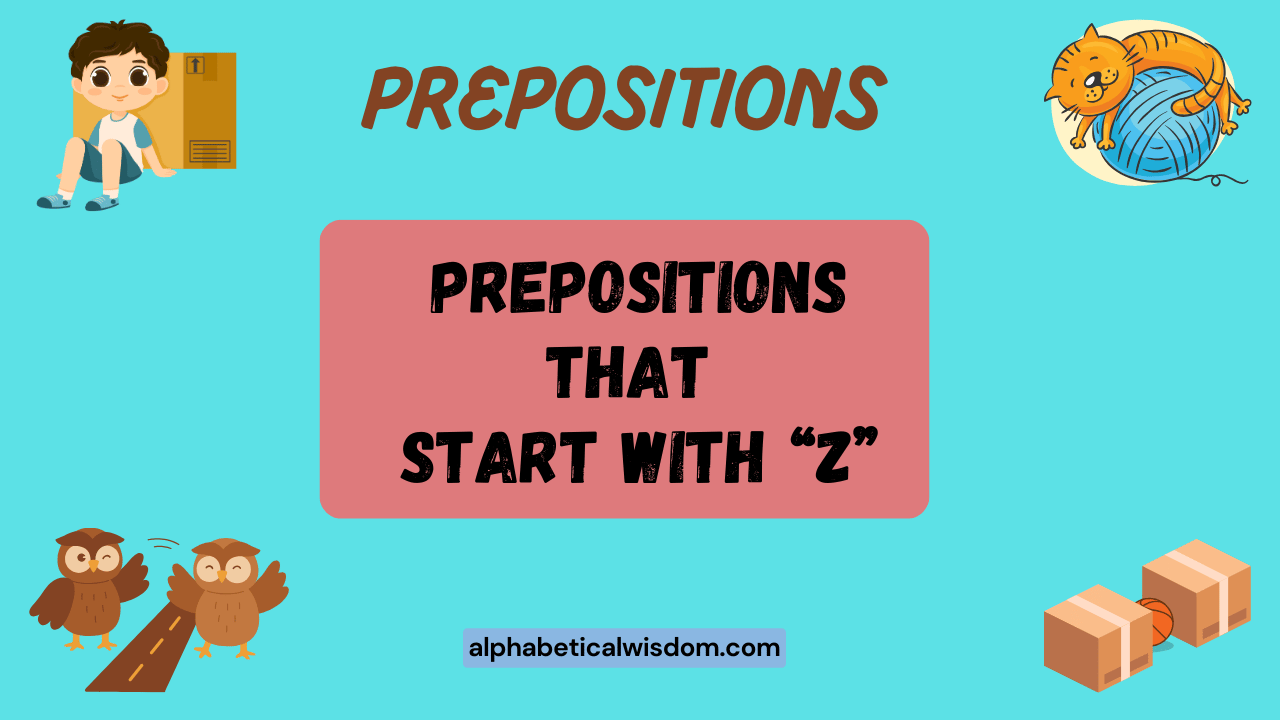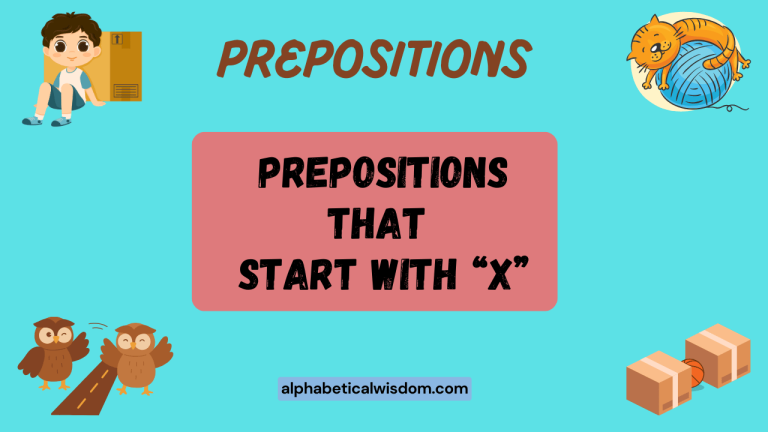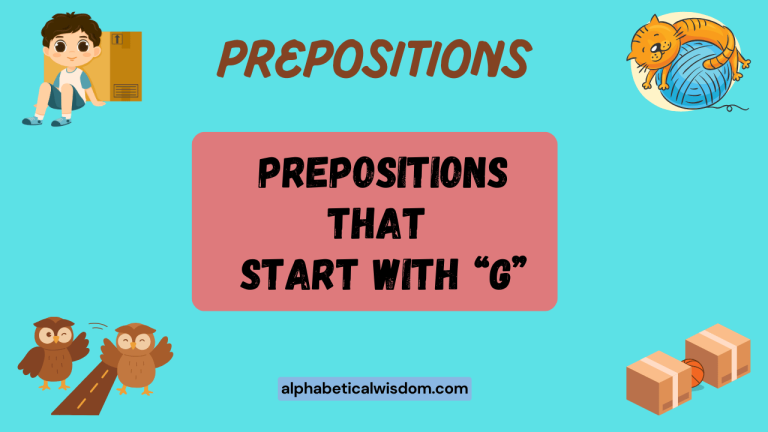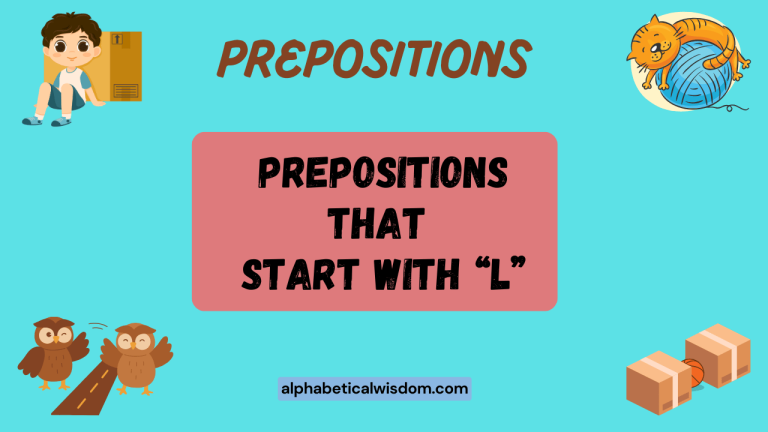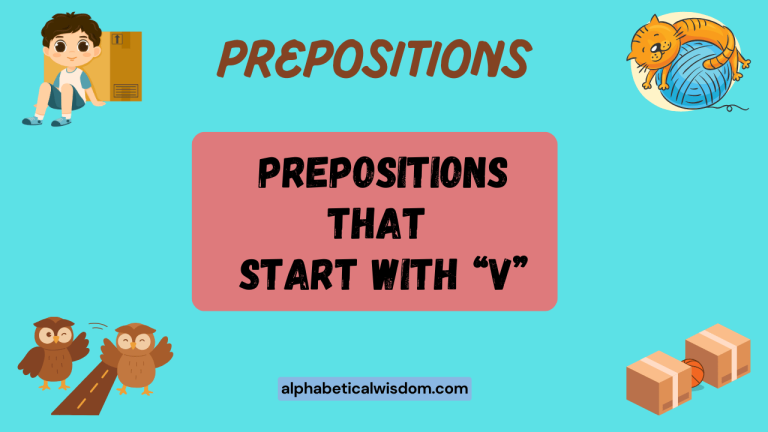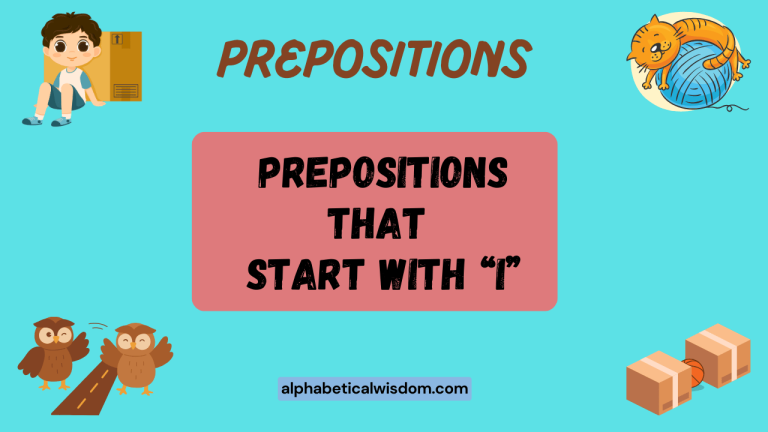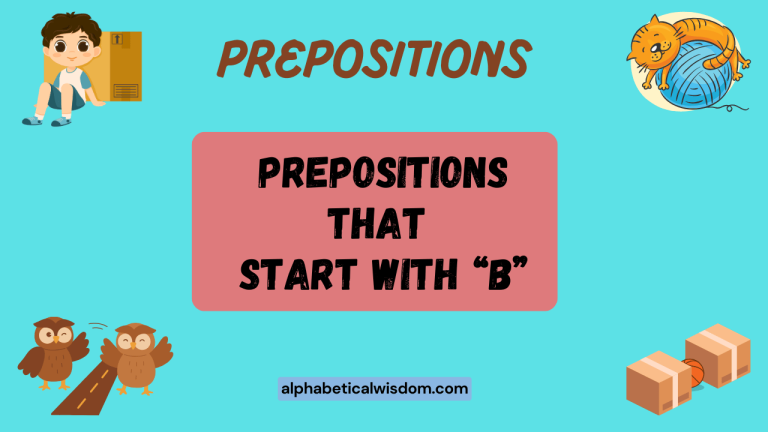Prepositions Starting With Z: A Comprehensive Guide
Understanding prepositions is crucial for mastering English grammar. While prepositions starting with “Z” are rare, knowing how they function can significantly enhance your language skills.
This comprehensive guide explores these prepositions, their definitions, usages, and common pitfalls. Whether you’re a student, a teacher, or simply an English enthusiast, this article will provide you with the knowledge and practice necessary to confidently use “Z” prepositions.
This article is designed to be beneficial for English language learners of all levels, from beginners seeking to solidify their foundational knowledge to advanced speakers aiming to refine their grammar skills. By understanding the nuances of these unique prepositions, you can improve your writing, speaking, and overall comprehension of the English language.
Table of Contents
- Introduction
- Definition of Prepositions
- Structural Breakdown of Prepositions
- Types and Categories of Prepositions
- Examples of Prepositions Starting with Z
- Examples of “Zeit”
- Examples of “Zonder”
- Usage Rules for Prepositions
- Usage Rules for “Zeit”
- Usage Rules for “Zonder”
- Common Mistakes with Prepositions
- Practice Exercises
- Exercise 1: Fill in the Blanks
- Exercise 2: Sentence Correction
- Advanced Topics
- Frequently Asked Questions (FAQ)
- Conclusion
Definition of Prepositions
A preposition is a word that connects a noun, noun phrase, or pronoun to another word or element in a sentence. Prepositions typically indicate location, direction, time, or the relationship between objects and people. They are essential for creating clear and coherent sentences by providing context and specifying the connections between different parts of a sentence.
Prepositions often come before a noun or pronoun, which is called the object of the preposition. The preposition and its object together form a prepositional phrase. This phrase can function as an adjective or an adverb, modifying other words in the sentence. Understanding the function of prepositions is critical for accurate and effective communication in English.
While prepositions are often small words, such as in, on, at, and to, they play a significant role in conveying meaning. They help us understand the spatial, temporal, and logical relationships between the elements of a sentence. Without prepositions, our sentences would lack clarity and precision.
Structural Breakdown of Prepositions
The structure of prepositions is relatively simple, but their function within a sentence can be complex. A typical prepositional phrase consists of a preposition followed by its object. The object is usually a noun or pronoun, but it can also be a noun phrase or a gerund (a verb acting as a noun).
Here’s a basic breakdown of the structure:
Preposition + Object of the Preposition = Prepositional Phrase
For example, in the phrase “in the garden,” “in” is the preposition, and “the garden” is the object of the preposition. The entire phrase “in the garden” functions as an adverbial phrase, modifying the verb or other element in the sentence.
Prepositions can also be part of more complex structures, such as compound prepositions (e.g., according to, in spite of) or phrasal verbs (e.g., look after, get on with). These structures require a deeper understanding of prepositional usage to ensure correct grammar.
Types and Categories of Prepositions
Prepositions can be categorized based on their meaning or function. The most common categories include:
- Prepositions of Time: Indicate when something happens (e.g., at, on, in, before, after).
- Prepositions of Place: Indicate where something is located (e.g., at, on, in, under, over).
- Prepositions of Direction: Indicate movement or direction (e.g., to, from, into, onto, through).
- Prepositions of Agent: Indicate the doer of an action (e.g., by).
- Prepositions of Instrument: Indicate the tool or means used to perform an action (e.g., with).
Understanding these categories can help you choose the correct preposition for a given context. However, some prepositions can fall into multiple categories depending on their usage. For example, “at” can be a preposition of time (at 5 PM) or a preposition of place (at the station).
While this article focuses on prepositions starting with “Z,” it’s important to remember that these are relatively rare. The vast majority of prepositions fall into the categories listed above and begin with other letters.
Examples of Prepositions Starting with Z
Prepositions that start with the letter “Z” are exceptionally rare in English. In fact, there are no commonly used, standard English prepositions that begin with “Z.” However, some words that might resemble prepositions or function similarly in specific contexts can be found in other languages or specialized fields.
For the purpose of this article, we will consider two terms: “Zeit” (from German) and “Zonder” (from Dutch), and explore how they can sometimes function in ways similar to prepositions.
Examples of “Zeit”
“Zeit” is a German word meaning “time.” While it’s not a preposition in the traditional English sense, it can be used in phrases that function similarly to prepositional phrases, especially in philosophical or technical contexts where German terminology is retained. In these cases, it indicates a time frame or period during which something occurs.
The following table provides examples of how “Zeit” can be used in sentences, along with explanations of its function and meaning:
| Sentence | Explanation | Translation/Similar English Usage |
|---|---|---|
| “In der Zeit des Umbruchs entstanden viele neue Ideen.” | “Zeit” indicates the time period during which new ideas emerged. | “During the time of upheaval, many new ideas emerged.” |
| “Zeit seines Lebens war er ein Forscher.” | “Zeit” indicates the duration of his life. | “Throughout his life, he was a researcher.” |
| “Die Maschine arbeitet Zeit dem Startsignal.” | “Zeit” indicates the period since the start signal. | “The machine has been working since the start signal.” |
| “Zeit dem Vertragsschluss hat sich viel verändert.” | “Zeit” indicates the period after the contract was signed. | “Since the conclusion of the contract, much has changed.” |
| “Zeit der Revolution gab es viele Unruhen.” | “Zeit” indicates the period of the revolution. | “During the revolution, there were many disturbances.” |
| “Er hat sich Zeit seiner Studien intensiv mit dem Thema beschäftigt.” | “Zeit” indicates the period of his studies. | “During his studies, he intensively studied the topic.” |
| “Zeit dem Unfall hat sie Angst zu fahren.” | “Zeit” indicates the period after the accident. | “Since the accident, she is afraid to drive.” |
| “Zeit meiner Kindheit habe ich viele Sommer hier verbracht.” | “Zeit” indicates the period of my childhood. | “During my childhood, I spent many summers here.” |
| “Zeit der Bauarbeiten ist die Straße gesperrt.” | “Zeit” indicates the period of construction. | “During the construction work, the road is closed.” |
| “Zeit des Konzerts regnete es stark.” | “Zeit” indicates the period of the concert. | “During the concert, it rained heavily.” |
| “Zeit des Krieges herrschte große Not.” | “Zeit” indicates the period of the war. | “During the war, there was great hardship.” |
| “Zeit der Ernte arbeiten alle auf den Feldern.” | “Zeit” indicates the period of harvest. | “During the harvest, everyone works in the fields.” |
| “Zeit der Dürre war das Land ausgedörrt.” | “Zeit” indicates the period of drought. | “During the drought, the land was parched.” |
| “Zeit des Lockdowns waren viele Geschäfte geschlossen.” | “Zeit” indicates the period of lockdown. | “During the lockdown, many shops were closed.” |
| “Zeit der Ferien reisen viele Menschen.” | “Zeit” indicates the period of holidays. | “During the holidays, many people travel.” |
| “Zeit des Festivals war die Stadt voller Leben.” | “Zeit” indicates the period of the festival. | “During the festival, the city was full of life.” |
| “Zeit des Studiums wohnte er in einer WG.” | “Zeit” indicates the period of his studies. | “During his studies, he lived in a shared apartment.” |
| “Zeit der Revolution gab es viele Veränderungen.” | “Zeit” indicates the period of the revolution. | “During the revolution, there were many changes.” |
| “Zeit des Umbaus war das Haus unbewohnbar.” | “Zeit” indicates the period of renovation. | “During the renovation, the house was uninhabitable.” |
| “Zeit der Epidemie trugen alle Masken.” | “Zeit” indicates the period of the epidemic. | “During the epidemic, everyone wore masks.” |
As shown above, “Zeit” is frequently used to define a specific timeframe, similar to English prepositions like “during” or “since.” While not a direct prepositional equivalent, its contextual usage mirrors the function of prepositions in establishing temporal relationships within a sentence.
Examples of “Zonder”
“Zonder” is a Dutch word meaning “without.” In certain contexts, particularly when discussing loanwords or Dutch influences in specific fields, “zonder” can function similarly to the English preposition “without.” It indicates the absence of something or a condition lacking a particular element.
Here are some examples of how “zonder” might be used in sentences and how it functions:
| Sentence | Explanation | Translation/Similar English Usage |
|---|---|---|
| “De koffie is zonder suiker.” | “Zonder” indicates the absence of sugar in the coffee. | “The coffee is without sugar.” |
| “Hij ging zonder toestemming naar binnen.” | “Zonder” indicates he entered without permission. | “He went inside without permission.” |
| “Zonder jou kan ik dit niet doen.” | “Zonder” indicates the impossibility of doing something without the person. | “Without you, I cannot do this.” |
| “De taart is zonder gluten.” | “Zonder” indicates the absence of gluten in the cake. | “The cake is without gluten.” |
| “Ze verliet het huis zonder sleutels.” | “Zonder” indicates she left the house lacking keys. | “She left the house without keys.” |
| “Zonder water kunnen planten niet leven.” | “Zonder” indicates the necessity of water for plants to live. | “Without water, plants cannot live.” |
| “De vergadering was zonder resultaat.” | “Zonder” indicates the meeting produced no results. | “The meeting was without result.” |
| “Hij fietste zonder licht.” | “Zonder” indicates he cycled lacking lights. | “He cycled without lights.” |
| “Zonder geld kan je niet veel kopen.” | “Zonder” indicates the necessity of money to buy things. | “Without money, you cannot buy much.” |
| “De film was zonder ondertitels.” | “Zonder” indicates the absence of subtitles in the film. | “The film was without subtitles.” |
| “Zonder inspanning geen resultaat.” | “Zonder” indicates the necessity of effort for results. | “Without effort, no result.” |
| “Ze kwam zonder aankondiging.” | “Zonder” indicates she arrived lacking announcement. | “She came without announcement.” |
| “Zonder twijfel is hij de beste.” | “Zonder” indicates the absence of doubt about him being the best. | “Without a doubt, he is the best.” |
| “De soep is zonder zout.” | “Zonder” indicates the absence of salt in the soup. | “The soup is without salt.” |
| “Hij ging op reis zonder plan.” | “Zonder” indicates he traveled lacking a plan. | “He went on a trip without a plan.” |
| “Zonder liefde is het leven leeg.” | “Zonder” indicates the necessity of love for life to be full. | “Without love, life is empty.” |
| “De auto is zonder benzine.” | “Zonder” indicates the absence of petrol in the car. | “The car is without petrol.” |
| “Ze danste zonder schoenen.” | “Zonder” indicates she danced lacking shoes. | “She danced without shoes.” |
| “Zonder training kan je geen marathon lopen.” | “Zonder” indicates the necessity of training to run a marathon. | “Without training, you cannot run a marathon.” |
| “De brief was zonder datum.” | “Zonder” indicates the absence of a date on the letter. | “The letter was without a date.” |
The examples above illustrate how “zonder” functions similarly to the English preposition “without” by indicating the absence of something. While it’s a Dutch word, its function is directly comparable to that of a preposition in English sentences.
Usage Rules for Prepositions
While standard English does not have commonly used prepositions starting with “Z,” understanding the rules for preposition usage in general is crucial. Prepositions must be followed by a noun, pronoun, or noun phrase (the object of the preposition).
The entire prepositional phrase then modifies another word or phrase in the sentence.
Here are some general rules to keep in mind:
- Placement: Prepositions usually come before their objects.
- Object Case: If the object of the preposition is a pronoun, use the objective case (e.g., me, him, her, us, them).
- Clarity: Choose the preposition that best expresses the relationship you want to convey.
- Idioms: Be aware of idiomatic expressions that use specific prepositions (e.g., agree with, depend on).
The following sections will address the specific usage rules for “Zeit” and “Zonder” in contexts where they might function similarly to prepositions.
Usage Rules for “Zeit”
When using “Zeit” in contexts where it functions similarly to a preposition, remember that it typically requires a genitive case in German (although this can be simplified in modern usage). In English, you would translate the phrase to use prepositions like “during,” “since,” or “throughout,” depending on the intended meaning.
Key points to consider when encountering “Zeit” in texts:
- Context: Determine the time period or duration being referenced.
- Translation: Translate the phrase using the appropriate English preposition (e.g., “during,” “since,” “throughout”).
- Grammar: Ensure the rest of the sentence is grammatically correct in English.
Usage Rules for “Zonder”
When using “zonder,” treat it as you would the English preposition “without.” It should be followed by a noun, pronoun, or noun phrase indicating what is absent. The phrase then functions as an adverbial or adjectival modifier.
Key points to consider when encountering “zonder” in texts:
- Meaning: “Zonder” always indicates the absence of something.
- Translation: Directly translate it as “without” in English.
- Grammar: Ensure the sentence structure is correct with “without” in place.
Common Mistakes with Prepositions
Even though there are no common English prepositions starting with “Z”, it’s useful to review common mistakes made with prepositions in general. These mistakes often involve incorrect preposition choice, misuse of idioms, or incorrect object case.
Here are some common mistakes and how to correct them:
| Incorrect | Correct | Explanation |
|---|---|---|
| “I am agree with you.” | “I agree with you.” | The verb “agree” requires the preposition “with” when followed by a person. |
| “He is afraid from spiders.” | “He is afraid of spiders.” | The correct preposition to use with “afraid” is “of.” |
| “She is good on math.” | “She is good at math.” | The correct preposition to use with “good” in this context is “at.” |
| “They arrived to the airport.” | “They arrived at the airport.” | The correct preposition to use with “arrived” when referring to a place is “at.” |
| “He depends of his parents.” | “He depends on his parents.” | The correct preposition to use with “depend” is “on.” |
| “The book is in the table.” | “The book is on the table.” | “On” is used for surfaces. “In” is used for enclosed spaces. |
| “I went to home.” | “I went home.” | “Home” does not require a preposition before it when used as an adverb. |
| “Between you and I…” | “Between you and me…” | “Me” is the objective case and is required after a preposition. |
| “She is waiting for him since two hours.” | “She has been waiting for him for two hours.” | Use “for” with a period of time and the present perfect continuous tense. |
| “He is interested on history.” | “He is interested in history.” | The correct preposition to use with “interested” is “in.” |
Avoiding these common mistakes will help you use prepositions more accurately and effectively in your writing and speaking.
Practice Exercises
These exercises will help you practice using prepositions correctly. While focusing on general preposition usage, these exercises reinforce the principles discussed in this guide.
Pay attention to context and choose the most appropriate preposition for each sentence.
Exercise 1: Fill in the Blanks
Fill in the blanks with the most appropriate preposition.
| Question | Answer |
|---|---|
| 1. She is arriving _______ 6 PM. | at |
| 2. The cat is hiding _______ the bed. | under |
| 3. He is going _______ the store. | to |
| 4. The book is _______ the table. | on |
| 5. They live _______ New York. | in |
| 6. She is talking _______ her friend. | to |
| 7. He is coming _______ the party. | from |
| 8. The picture is _______ the wall. | on |
| 9. She is sitting _______ the chair. | in |
| 10. He is walking _______ the park. | through |
Exercise 2: Sentence Correction
Correct the sentences with incorrect preposition usage.
| Incorrect Sentence | Correct Sentence |
|---|---|
| 1. I am agree to your proposal. | I agree with your proposal. |
| 2. She is afraid from the dark. | She is afraid of the dark. |
| 3. He is good on playing the piano. | He is good at playing the piano. |
| 4. They arrived to the hotel late. | They arrived at the hotel late. |
| 5. She depends of her parents for support. | She depends on her parents for support. |
| 6. The keys are in the floor. | The keys are on the floor. |
| 7. I am going to home now. | I am going home now. |
| 8. Between you and I, this is a secret. | Between you and me, this is a secret. |
| 9. He has been waiting for her since three hours. | He has been waiting for her for three hours. |
| 10. She is interested on learning new languages. | She is interested in learning new languages. |
Advanced Topics
For advanced learners, it’s important to understand the nuances of prepositional usage in complex sentences and idiomatic expressions. This includes recognizing how prepositions can affect the meaning of a verb (phrasal verbs) and how they function in more abstract contexts.
Here are some advanced topics to consider:
- Phrasal Verbs: Understanding how prepositions change the meaning of verbs (e.g., look up, get over).
- Prepositional Stranding: Recognizing when it’s acceptable to end a sentence with a preposition (e.g., “Who are you talking to?”).
- Abstract Usage: Understanding how prepositions are used in more abstract contexts to express complex relationships (e.g., in terms of, with regard to).
Mastering these advanced topics will allow you to use prepositions with greater precision and confidence, enhancing your overall fluency in English.
Frequently Asked Questions (FAQ)
Here are some frequently asked questions about prepositions:
- What is a preposition?
A preposition is a word that connects a noun, noun phrase, or pronoun to another word or element in a sentence, indicating relationships of location, time, direction, etc.
- What is the object of a preposition?
The object of a preposition is the noun, noun phrase, or pronoun that follows the preposition and completes its meaning. For example, in the phrase “in the garden,” “the garden” is the object of the preposition.
- What is a prepositional phrase?
A prepositional phrase consists of a preposition and its object, along with any modifiers. It functions as an adjective or adverb in the sentence.
- Why are prepositions important?
Prepositions are crucial for creating clear and coherent sentences by providing context and specifying the relationships between different parts of a sentence.
- Are there any prepositions that start with “Z” in English?
No, there are no commonly used, standard English prepositions that begin with the letter “Z.” However, words like “Zeit” (German) and “Zonder” (Dutch) can function similarly to prepositions in specific contexts.
- How do I choose the correct preposition?
Consider the relationship you want to express (location, time, direction, etc.) and choose the preposition that best fits the context. Pay attention to idiomatic expressions and common usage.
- What are some common mistakes with prepositions?
Common mistakes include incorrect preposition choice, misuse of idioms, and incorrect object case. Reviewing these mistakes and practicing correct usage can help you avoid them.
- What are phrasal verbs?
Phrasal verbs are verbs combined with a preposition or adverb, where the combination creates a new meaning. For example, “look up” (to search for information) is a phrasal verb.
- What is prepositional stranding?
Prepositional stranding is when a sentence ends with a preposition. While sometimes discouraged, it’s often acceptable in informal English (e.g., “Who are you talking to?”).
- How can I improve my preposition usage?
Practice regularly, pay attention to context, review common mistakes, and study idiomatic expressions. Reading and listening to native English speakers can also help improve your understanding of prepositional usage.
Conclusion
While English lacks common prepositions starting with “Z,” understanding the general principles of preposition usage is essential for effective communication. By studying the definitions, rules, and common mistakes associated with prepositions, you can improve your writing and speaking skills.
Remember to practice regularly and pay attention to context to choose the most appropriate preposition for each situation. Words like “Zeit” and “Zonder” offer unique insights into how other languages use similar concepts, broadening your linguistic perspective.
Continue to expand your knowledge by exploring advanced topics such as phrasal verbs and prepositional stranding. With dedication and practice, you can master the nuances of prepositions and communicate with clarity and confidence.
Keep learning and exploring the fascinating world of English grammar!
